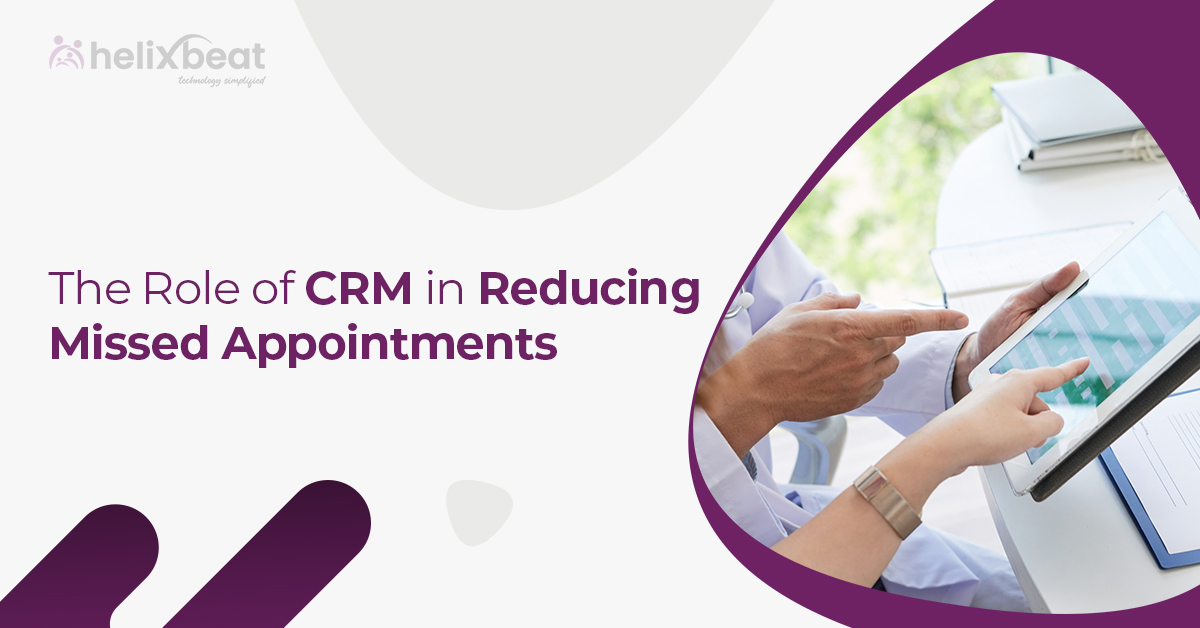Missed appointments are a challenge that clinics and hospitals face daily. For patients, skipping a scheduled visit can mean delayed diagnoses, interrupted treatments, and worsened health outcomes. For healthcare providers, the stakes are equally high: missed appointments disrupt workflows, leave costly time slots unutilized, and impact revenue streams that fund critical medical services. These ripple effects can compromise both patient satisfaction and the operational efficiency of the healthcare system.
From the patient’s perspective, reasons for missing appointments are often varied—forgetfulness, lack of reminders, or difficulties in rescheduling. On the provider’s side, traditional systems that rely on manual reminders often struggle to keep up with the volume and complexity of patient management. This disconnect creates a pressing need for a more innovative and streamlined solution.
That’s where patient CRM (Customer Relationship Management) systems bridge the communication gap between patients and healthcare providers. By automating appointment reminders, providing user-friendly rescheduling options, and promoting consistent engagement, patient CRM systems tackle the problem of missed appointments.
In this blog, we’ll explore how the patient CRM system PULSE helps providers optimize operations while empowering patients to stay on top of their health commitments.
Table of Contents
The Cost of Missed Appointments
Missed appointments are more than just an inconvenience—they are a silent drain on clinics and hospitals’ financial and operational health. Each no-show represents lost revenue and a cascade of inefficiencies that ripple through the healthcare system. Here’s a detailed look at the multifaceted impact of missed appointments:
Financial Losses
Every patient who fails to show up has a direct revenue hit. Healthcare facilities often allocate resources based on expected patient visits, including staff time, equipment, room scheduling, etc. When a patient doesn’t arrive, that time slot gets wasted, which leads to unrecovered costs. For smaller practices, this can mean significant financial strain.
Hidden Costs
The true cost of missed appointments extends beyond immediate financial losses. Here’s how:
- Wasted Resources: Medical staff, including doctors, nurses, and administrative personnel, often spend time preparing for an appointment that never happens. This includes reviewing patient histories, setting up equipment, and updating schedules.
- Lost Patient Trust: Repeated no-shows can delay care for other patients and reduce patient satisfaction. In addition, a clinic perceived as inefficient risks losing loyal patients to competitors.
- Operational Inefficiencies: Unused time slots disrupt the workflow and complicate planning. As a result, the staff may be underutilized during missed appointments, while emergency add-ons or rescheduling can lead to overwork and burnout.
Why Traditional Appointment Management Systems Fall Short
Despite their best efforts, many healthcare providers still rely on traditional systems for appointment management, such as phone reminders or static scheduling platforms. However, these systems often lack the adaptability and intelligence needed to prevent no-shows effectively because:
- Provide Real-Time Adjustments: Traditional systems can’t dynamically fill last-minute cancellations with patients on a waiting list.
- Leverage Data Insights: Without predictive analytics, it’s difficult to identify patterns in patient behaviour, such as individuals prone to missing appointments.
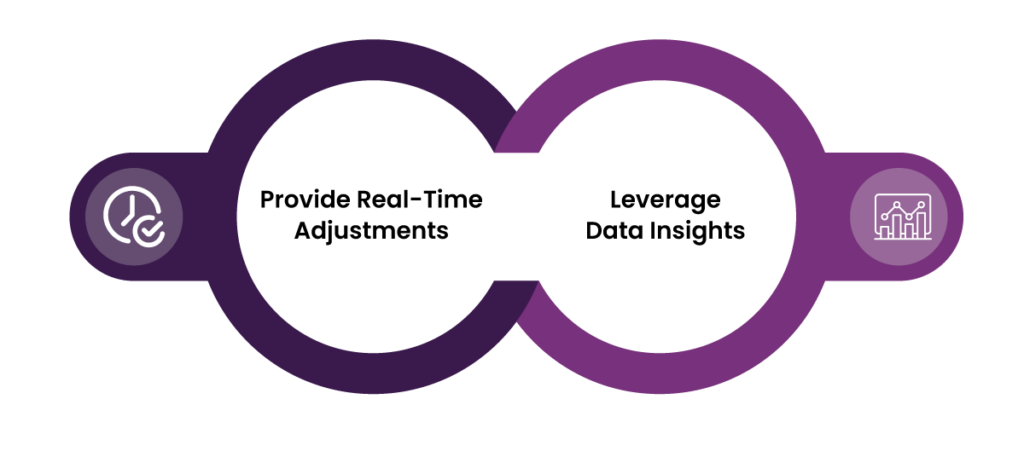
Therefore, healthcare providers need patient CRM systems that combine patient engagement and operational flexibility to address missed appointments.
Understanding Patient CRM Systems
While traditional CRMs have long been used in industries like retail or real estate to manage customer interactions, Patient CRMs are specifically tailored to meet the unique needs of healthcare providers and their patients.
What is a Patient CRM?
At its core, a patient CRM is a software solution designed to help healthcare organizations build stronger relationships with their patients. It consolidates patient information into a unified platform, which makes it easier for medical practitioners and administrative staff to access, organize, and act on critical data. However, unlike traditional CRMs, which focus primarily on sales funnels or lead generation, patient CRMs are patient-centric and focus on delivering better care.
A patient CRM isn’t just a storage tool—it’s a comprehensive system that helps manage the entire patient journey, from appointment scheduling to follow-ups and everything in between. It empowers healthcare providers to cultivate trust, improve care outcomes, and build long-term loyalty with their patients.
How is a Patient CRM Different from Traditional CRMs?
At first glance, a Patient CRM might seem like a regular CRM with a different name, but a closer look reveals key distinctions:
- Focus on Relationships Over Transactions: CRMs are often geared toward driving sales or closing deals in industries like retail or banking. In contrast, patient CRMs prioritize building meaningful relationships by addressing healthcare needs, improving access to care, and enhancing patient satisfaction.
- Emphasis on Compliance and Privacy: As mentioned before, patient CRMs are designed more profoundly, emphasising regulatory compliance, particularly in safeguarding sensitive patient information under laws like HIPAA. This makes them far more secure than traditional CRMs used in other industries.
- Specialized Tools for Healthcare Providers: Unlike generic CRMs, patient CRMs come equipped with features like treatment tracking, post-care follow-ups, and data integration capabilities, all of which cater specifically to the healthcare sector.
- Enhanced Patient Engagement: Healthcare requires more than transactional interactions. Therefore, patient CRMs actively engage patients by offering portals for accessing lab results, reminders for annual check-ups, and educational resources tailored to their conditions.
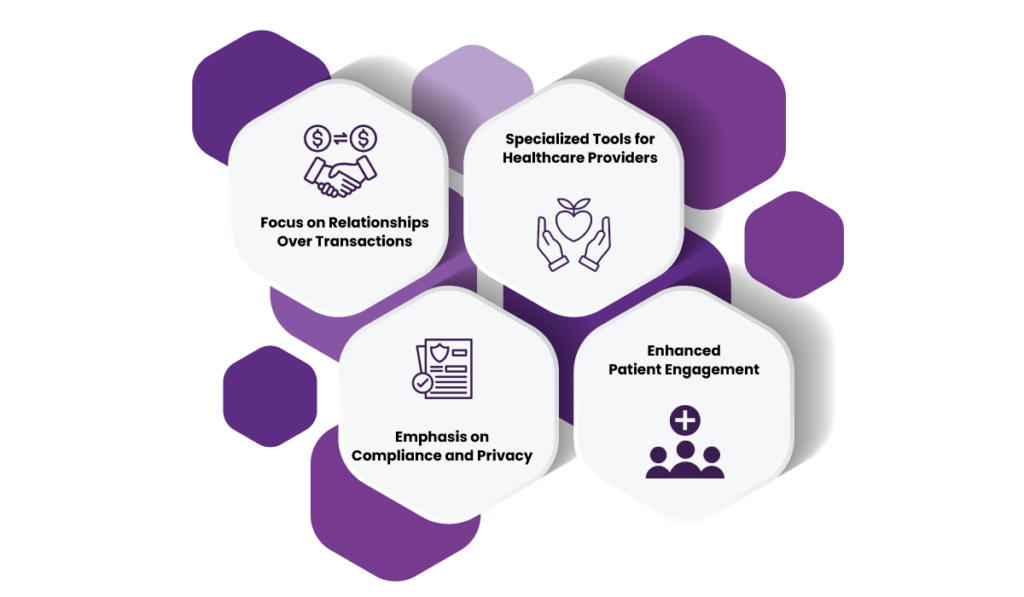
Key Features of Patient CRM Systems
Modern patient CRM systems are more than just digital filing cabinets; they come equipped with a suite of features to address the specific needs of healthcare providers. Here are some of the standout functionalities:
- Automated Reminders: Missed appointments can disrupt schedules and delay treatments, but automated reminders significantly reduce no-shows. These systems can send patients timely alerts via email, SMS, or app notifications about upcoming appointments, medication schedules, or follow-up consultations.
- Patient Communication Tools: Communication lies at the heart of effective healthcare. Patient CRMs like PULSE facilitate seamless interaction by offering features like secure messaging portals, personalized campaigns, and even teleconsultation integration.
- Appointment Management: Scheduling appointments manually is often prone to errors and time-consuming. However, patient CRMs provide intuitive interfaces where patients can book, reschedule, or cancel appointments without hassle, while healthcare staff can easily manage their calendars.
- Personalized Patient Care: By keeping detailed records of medical history, preferences, and past interactions, healthcare providers can offer tailored treatment plans and enhance patient satisfaction.
- HIPAA-Compliant Data Security: Safeguarding patient data is non-negotiable in the healthcare sector. Therefore, patient CRMs like PULSE have robust encryption and compliance mechanisms to protect sensitive information.
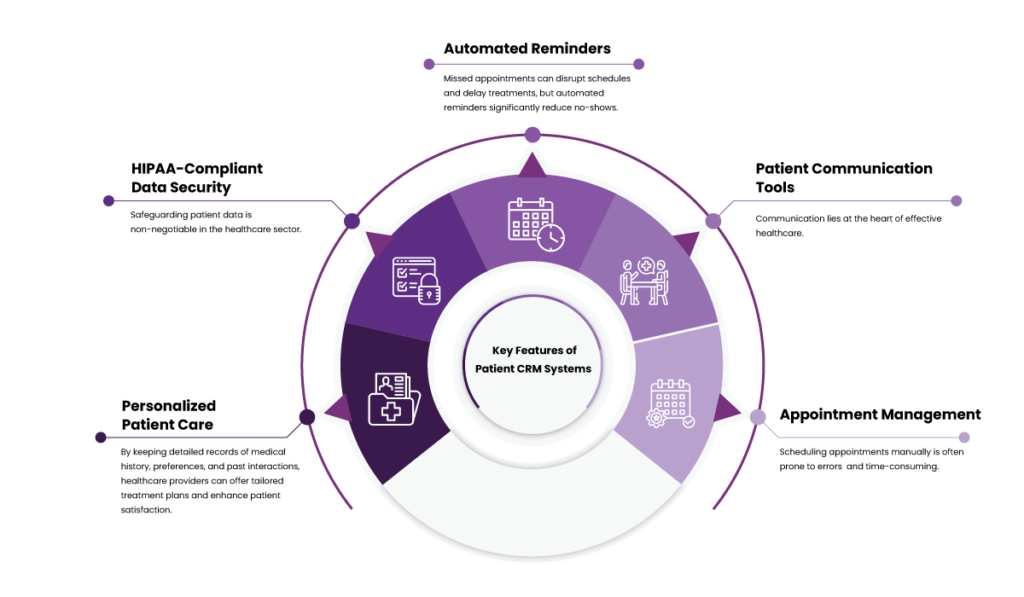
How PULSE Reduces Missed Appointments
With PULSE, clinics can minimize missed appointments and facilitate better patient engagement. Here’s how:
1. Automated Appointment Reminders
One of the most effective ways PULSE combats missed appointments is through automated reminders via SMS, email, or app notifications. The system also allows clinics to customize the timing of these reminders—for example, sending a message a week before the appointment, followed by a gentle nudge a day prior. This flexibility caters to diverse patient schedules and reduces the likelihood of forgotten appointments.
2. Real-Time Scheduling Updates
Life happens, and sometimes appointments need to be rescheduled. PULSE simplifies this process for both patients and clinics. With real-time scheduling updates, patients can view available slots and reschedule with just a few taps, reducing the friction often associated with appointment changes.
3. Patient Engagement and Communication
Missed appointments often stem from a lack of consistent communication. PULSE addresses this by creating a proactive communication channel between patients and providers. Beyond appointment reminders, the platform facilitates providers’ sharing of regular updates, such as wellness tips or educational content.
This ongoing engagement builds trust and keeps healthcare top-of-mind for patients. For example, patients undergoing orthodontic treatment might receive monthly updates on what to expect next in their journey or tips to improve results. These small but impactful interactions help patients feel cared for and more connected to their healthcare provider.
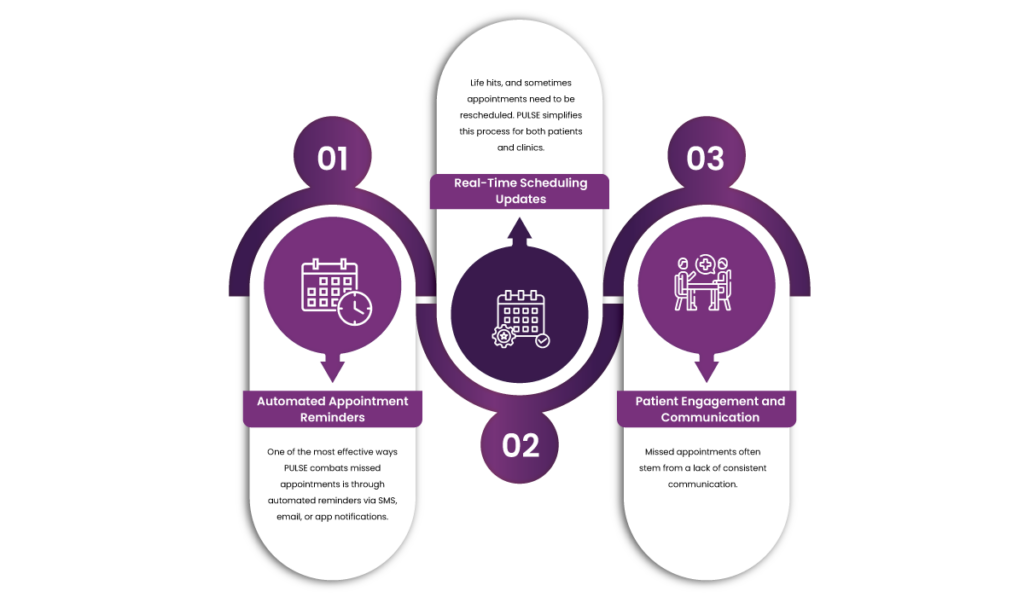
Beyond Reducing Missed Appointments: The Comprehensive Workflow of PULSE
PULSE is more than just a patient CRM system aimed at reducing missed appointments. It’s an end-to-end Patient-Provider Unified Ledger designed to enhance patient engagement, streamline operations, and improve the healthcare experience for providers and patients. Here’s a detailed breakdown of how PULSE achieves this through its comprehensive workflow:
1. Data Collection
The modern patient CRM system PULSE integrates patient data from diverse sources, such as Electronic Health Records (EHRs), wearable devices, laboratory results, and pharmacies. This comprehensive data collection gives providers a holistic view of a patient’s health journey. Additionally, the ability to include data from wearables and other personal health devices helps patients to track their overall health metrics.
2. Data Sharing
The ledger facilitates secure data sharing governed by patient consent and role-based permissions. This process grants patients complete control over who accesses their information and for what purpose. Such a transparent system cultivates trust between patients and providers, thus encouraging patients to engage in conversations about their health without fear of data misuse.
3. Interaction Recording
Every interaction, including appointments, treatments, test results, and prescriptions, is documented on the ledger. This comprehensive log enables patients to review their medical history at any time, which helps them better understand their treatment plans and progress. Thus, by giving patients a clear and accessible record of their healthcare interactions, the modern patient CRM system empowers them to ask informed questions, discuss alternative treatments, or provide care feedback, deepening their engagement and satisfaction.
4. Automation
Smart contracts automate critical processes such as billing, insurance claims, and care coordination. This automation reduces administrative burdens and frees up time for healthcare providers to focus on direct patient care. For patients, the elimination of delays in claims processing or appointment scheduling creates a smoother experience.
5. Auditing and Compliance
PULSE includes built-in audit trails to track all activities, thereby meeting regulatory requirements such as HIPAA or GDPR. While these compliance measures are critical for safeguarding data privacy, they also play a key role in building patient confidence. As a result, patients feel reassured knowing their data is being handled securely and ethically.
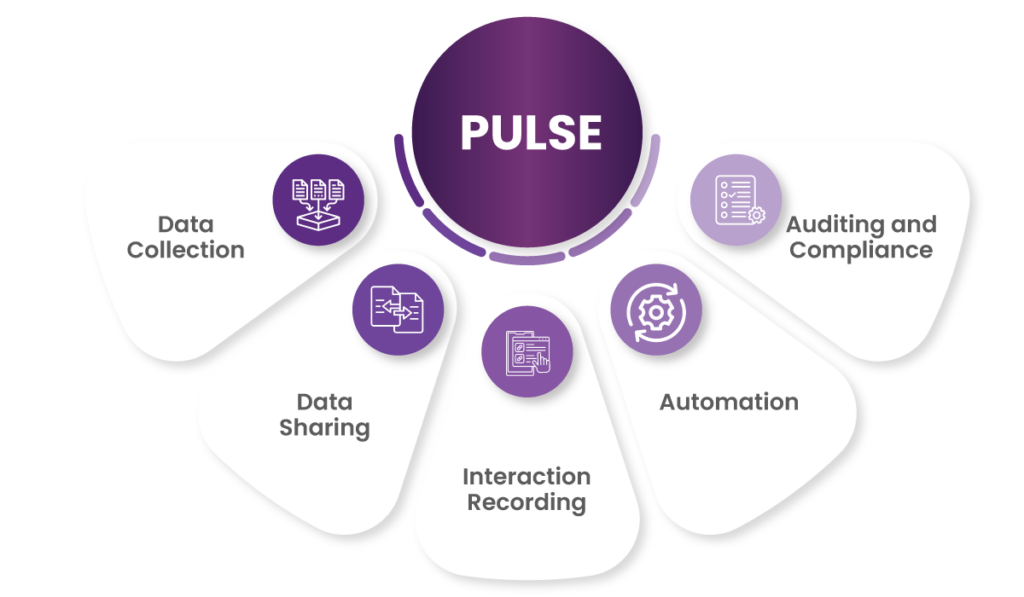
Final Words
Today, missed appointments can disrupt operations and hinder patient care. A robust Patient CRM system like PULSE is the key to addressing these challenges. By offering automated reminders, real-time scheduling, and proactive patient engagement, PULSE ensures that healthcare providers can significantly reduce missed appointments while enhancing operational efficiency.
But PULSE doesn’t stop there. Its comprehensive patient management features create a seamless and personalized healthcare experience. From data security and compliance to simplified workflows and enriched communication, PULSE empowers both providers and patients to focus on what truly matters—improving health outcomes.
Are you ready to take your healthcare operations to the next level?
Discover how PULSE can revolutionize patient engagement and streamline your clinic’s appointment management process. Contact us today to explore tailored solutions for your healthcare practice. Let’s reduce no-shows, boost patient satisfaction, and make healthcare more accessible and efficient—together with PULSE!
FAQs
1. Why are missed appointments a problem in healthcare?
Missed appointments refer to instances where patients fail to show up for their scheduled healthcare visits without prior cancellation. They create significant challenges for healthcare providers, including financial losses, operational inefficiencies, and resource wastage. For patients, missing appointments can result in delayed diagnoses, disrupted treatments, and negative health outcomes.
2. How does a Patient CRM system reduce missed appointments?
Patient CRM systems automate appointment reminders through emails, SMS, or app notifications, making it easier for patients to remember their scheduled visits. These systems also offer flexible rescheduling options and proactive communication tools, which reduce the friction of managing appointments and improve patient engagement.
3. What makes a Patient CRM different from traditional CRMs?
While traditional CRMs focus on transactional interactions like sales or customer service, patient CRMs are explicitly designed for the healthcare sector. They emphasize patient relationships, maintain compliance with data privacy regulations like HIPAA, and have specialized tools like treatment tracking, appointment scheduling, and patient engagement. This healthcare-centric approach makes Patient CRMs more effective in managing the unique needs of providers and patients.
4. What features should I look for in a Patient CRM?
A modern Patient CRM like PULSE offers the following key features:
- Automated Reminders: To reduce no-shows by reminding patients of upcoming appointments.
- Appointment Management: Allowing patients to easily book, reschedule, or cancel appointments.
- Patient Communication Tools: Enabling secure messaging and sharing of educational content.
- Personalized Care Plans: Providing tailored recommendations based on patient history.
- Data Security: Ensuring HIPAA-compliant mechanisms for safeguarding sensitive patient information.
5. Can Patient CRM systems improve patient satisfaction?
Patient CRM systems significantly improve patient satisfaction by creating a more personalized and convenient healthcare experience. They offer timely reminders, easy rescheduling, and proactive communication, which make patients feel valued and supported throughout their healthcare journey. Features like secure messaging and access to medical records also empower patients to participate actively in their care.
6. How does PULSE help healthcare providers manage missed appointments?
PULSE offers several solutions to address missed appointments, including:
- Automated Reminders: Sending timely alerts to patients to prevent forgetfulness.
- Real-Time Scheduling Updates: Simplifying appointment rescheduling for patients and staff.
- Consistent Patient Engagement: Maintaining regular communication through updates, tips, and personalized content.
7. What operational challenges do missed appointments cause for healthcare providers?
Missed appointments disrupt workflows, leading to underutilized resources like staff and equipment. They also create scheduling gaps, which can overburden staff with emergency rescheduling or same-day adjustments. In addition, they impact financial stability by reducing revenue and increasing the administrative burden of managing no-shows.
8. What role does data security play in Patient CRM systems?
Data security is critical in healthcare due to the sensitive nature of patient information. Patient CRMs like PULSE include advanced encryption, secure data storage, and compliance with regulations such as HIPAA and GDPR. These measures protect patient data from unauthorized access while promoting trust between patients and healthcare providers.
9. How do Patient CRMs improve the overall healthcare experience?
Patient CRMs enhance the healthcare experience by streamlining processes for both providers and patients. Providers benefit from automated workflows, reduced administrative tasks, and improved scheduling efficiency. Patients enjoy greater convenience through user-friendly appointment management, personalized communication, and easy access to their medical records.
10. Why is consistent communication important in reducing missed appointments?
Consistent communication builds trust and keeps patients informed about their healthcare needs. Regular reminders, wellness tips, and updates about their treatments help patients stay engaged and prioritize their health commitments. Proactive communication also addresses common barriers to attendance, such as forgetfulness or confusion about appointment details.



